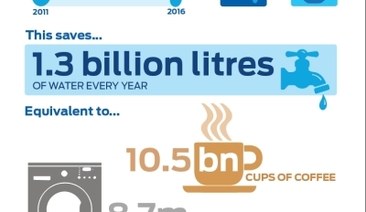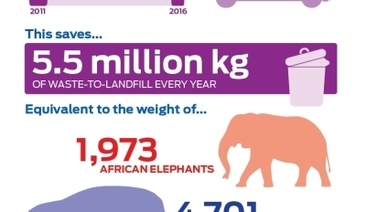News


Ford to Slash Landfill Waste by 70% in Five Years, Cut Water Use by 30% in New Green Manufacturing Plan
Ford Motor Company has committed to making massive cuts in the waste it sends to landfill, as well as the water it uses, across its European production.
The company said it will significantly increase the proportion of waste recycled and reused by cutting landfill waste by 70 percent. That means a reduction in the average landfill waste generated per vehicle to 1.5kg by 2016 from 5kg in 2011.
And, based on annual production of 1.2 million vehicles, Ford also will reduce water use by 30 percent saving €2.3 million over the same time period and approximately 1.3 billion liters per year. This equates to an average saving of 1,100 liters for each car or van produced.
“This plan represents our pledge to minimize Ford’s impact on the environment both before and after our customers get behind the wheel,” said Stephen Odell, chairman and CEO, Ford of Europe. “This goes hand in hand with our commitment to develop the most fuel efficient vehicles. Sustainability makes just as much sense for Ford as a business as it does for the environment.”
The announcement builds upon previous actions that have helped Ford of Europe become the global company’s lowest producer of landfill waste. Ford of Europe has cut landfill-waste generation by 40 percent since 2007 and reduced water use by 37 percent over the same period.
The new commitment covers manufacturing in Genk in Belgium, Valencia in Spain, Saarlouis and Cologne in Germany as well as Southampton, Bridgend and Dagenham in the UK. Genk, Saarlouis and Cologne had previously taken significant steps to reduce landfill waste and are now all waste-to-landfill free.
Ford says it will firstly work internally and closely with partners to reduce the resources used in production; secondly, to reduce the quantity of waste from that production; and finally, to ensure that as much waste as possible is recycled or used to generate energy.
Production of Ford’s new 1.0-liter EcoBoost engine in Cologne takes one such approach. The introduction of a new production line and new manufacturing techniques reduced water use by 37 percent compared to the manufacturing line it replaced. One part of the process sees the amount of coolant used to produce aluminum engine parts reduced from two liters to five milliliters.
“Sustainability enables us to make car production leaner and more cost-efficient. It’s both the right thing to do and the smart thing to do,” said Ford of Europe Manufacturing Director Dirk Heller.
